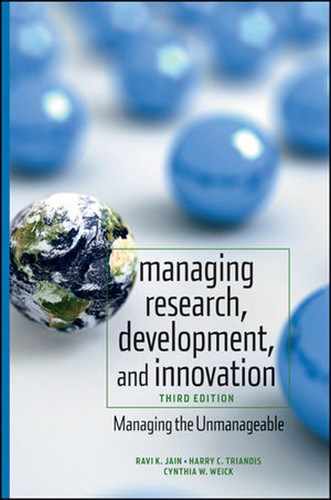3.4. RESEARCHER'S RELATIONSHIP WITH MANAGEMENT AND PEERS
Many researchers have a rather negative view of managers or directors of research organizations. As an example, at the Institute for Advanced Study, the famous physicist Oswald Veblen suggested that the Institute did not need a director. Instead, he proposed that the institute should have a rector, who would not have any power or authority to hatch forward-looking plans or schemes or develop any new institutional policy (Regis, 1987, p. 128). Some scientists at the institute joked that a good director should be "a little stupid" so that he would not come up with new ideas that might change the status quo of the institution. When Oppenheimer was being considered for the position of the director of the institute, some scientists advanced the truly shocking notion that perhaps the faculty could manage quite well on its own with only an administrator to manage business affairs. Later on when Oppenheimer became the director of the institute, he quite seriously suggested that the Institute could probably run quite well without a faculty (Regis, 1987, p. 129)!
One of the directors of the Institute for Advanced Study stated that many of the scientists claimed that they wanted to be free of routine administrative matters so they could focus their energies on research and scholarship. The director suggested that they did not mean a word of it. Although they want opportunities for research and scholarship, they also want managerial and executive powers (Regis, 1987, p. 38).
Power sharing is essential in an R&D organization. Yes, researchers do, in fact, want to share the managerial and executive authority with the administrative structure. Researchers, in particular, want to share those aspects of managerial and executive authority that affect their research activities. Naveh (2007) explains that the relationship between formalization, referring to structure and stability, and discretion, referring to spontaneity, affect research aspects such as technical proficiency, project duration, and project team size. Therefore some level of power sharing needs to be implemented between all parties involved.
On the other hand, researchers need to understand that accountability and some administrative duties also go with such power sharing. This simply cannot be avoided. In sharing these powers, researchers will have to do some administrative work, meet scheduled deadlines, listen to the views of others, compromise where there are differing views, and not engage in guerrilla warfare after the decisions are taken.
Some of the negative views that researchers have about management are based on their experiences with organizations. As of 1998 nearly 90 percent of Fortune 500 companies emphasized formal initiatives based on structure, stability, and following rules when running R&D projects (Naveh, 2007). There are cases at universities and research organizations where the administrative structure seems to grow at a proportionally higher rate than the size of the research group or faculty. As an example, when Oppenheimer was the director at the Institute of Advanced Study, he did not spend all of his time running the place. He even used to do some actual research. He had only one secretary, a business manager, and another administrative person. A few years after he left, the institute had an associate director and several assistants and secretaries (Regis, 1987, p. 285). The size of the administrative staff seems to grow geometrically and thus many scientists in R&D organizations and faculty members at universities feel that the administration lives for itself while research and teaching activities become side issues. Managers would be well advised to look periodically at the administrative structures in their own offices and question the necessity for every job.
